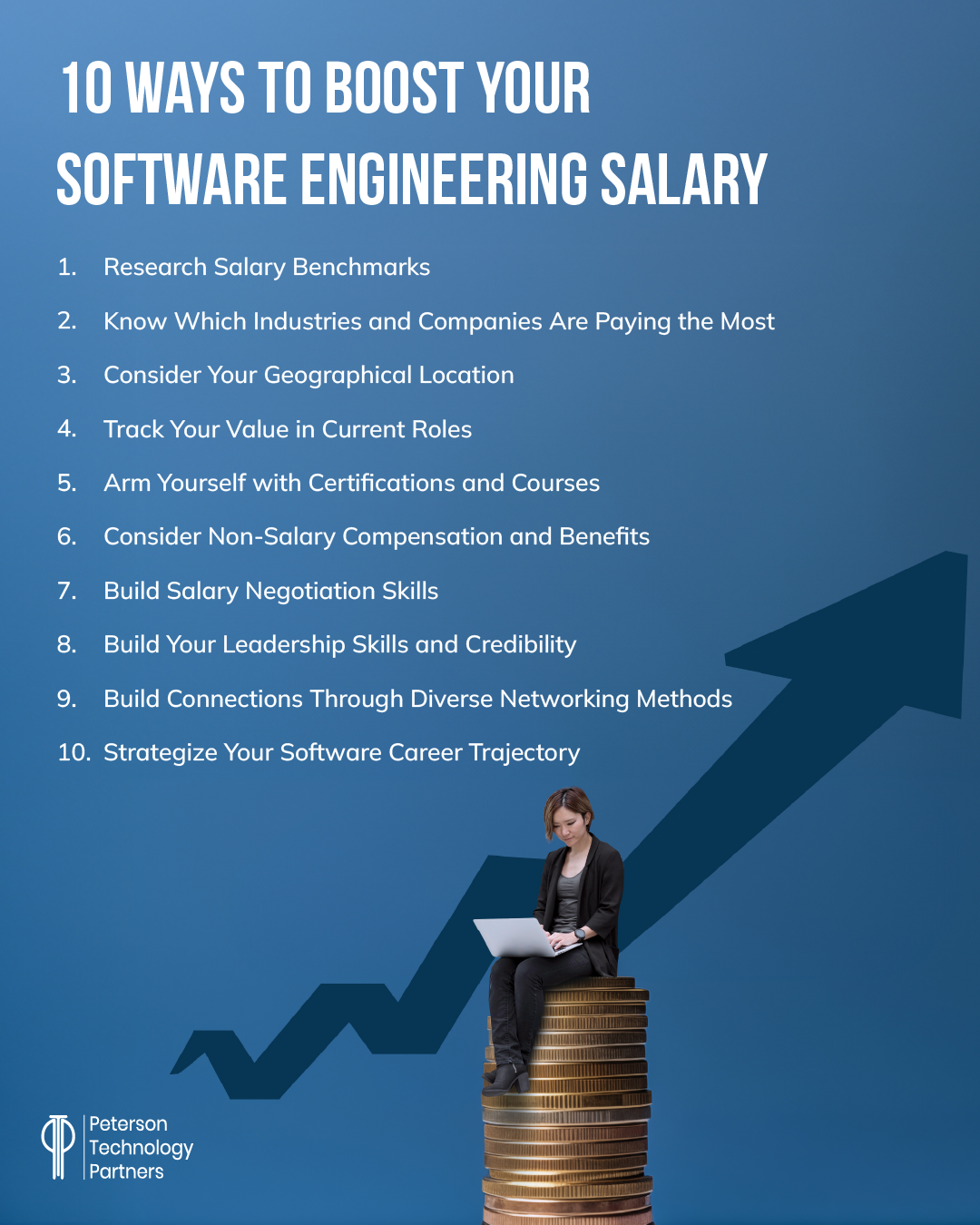There’s a lot more that goes into growing your tech salary than accumulating enough experience. The average software engineer makes $128,386 per year, according to Dice’s Tech Salary Report. But there are several other factors that can influence this number.
Take a more active approach to your software engineer salary growth. With these 10 practical tips, take control over your tech career and reach your earning potential.

1. Research Salary Benchmarks for Software Engineers
If you want to earn a higher software engineering salary, you need to come armed with knowledge about your role—not just the responsibilities and qualifications but how salaries are benchmarked. Before your next interview, review online sources like Glassdoor, the Bureau of Labor Statistics, and Blind. By consulting a diverse range of sources, from government data to employee reports, you can communicate your salary needs with confidence.
2. Know Which Industries and Companies Are Paying Software Engineers the Most
Businesses across all industries need software engineers, so it’s important to consider which ones are hiring and paying the most right now. Currently, some of the top-paying industries for software engineers are finance, security, AI, and other tech-centric sectors. However, as other industries increasingly prioritize digital transformation, you will start to see higher paying software engineering roles in areas like healthcare, education, manufacturing, and more.
[What are the most popular software engineering jobs? Find out in this PTP Report.]
3. Consider the Best Geographical Location for Software Engineer Jobs
As more cities try to establish themselves as tech hubs, following the footsteps of Silicon Valley, it’s helpful to consider how geography may play a role in software engineering salaries. San Francisco, San Jose, Seattle, New York, and Chicago are currently among the top-paying cities for software engineers. While being open to relocation would certainly boost your earning potential, you can also research companies that are based in tech hubs but are currently hiring remote workers.
4. Track Your Value in Current Software Engineering Roles
It’s always good to document the value you bring to every employer. This applies not only after you leave and are ready for your next venture but also as you progress at the company. Pay extra attention to tangible metrics (or KPIs) that are relevant to software engineering. Some examples include cycle time, code coverage, code churn (rework), change failure rate (CFR), defect detection ratio (DDR), and mean time to recovery (MTTR). By quantifying your value with tangible metrics, you can better leverage your expertise and increase your salary.
5. Arm Yourself with Software Engineering Certifications and Courses
Technical roles like software engineering lend themselves well to certifications and courses, so why not add the most relevant ones to your resume? Obtain (and demonstrate) in-demand skills and knowledge through platforms like Coursera, Udemy, and Pluralsight. Meanwhile, you can also prove your expertise via certifications in AWS, Google Cloud, and Microsoft Azure. For some firsthand insight on how to give your resume a competitive edge, check out communities like r/cscareerquestions on Reddit.
[How can software engineers prepare for AI? Learn in this PTP Report.]
6. Consider Non-Salary Compensation and Benefits for Software Engineers
This is also where you will want to consider the type of company you want to work for. For example, big tech companies like Google and Microsoft are likely to have the most competitive benefits packages. Meanwhile, startups, while they may not be able to offer big compensation packages, may instead offer opportunities for equity and other kinds of investment. Overall, make sure you have a clear picture of not just your financial needs but factors like environment, culture, and flexibility.
7. Build Salary Negotiation Skills
If you’ve already tackled numbers one and four of this list, then you’re already most of the way there. Once you’ve researched your salary benchmarks and audited your value in previous roles, consider your BATNA (best alternative to a negotiated agreement) so you don’t risk walking away with no good options. (For more tech salary negotiation tips, read this earlier edition of The PTP Report.)
8. Build Your Leadership Skills and Credibility
If you’re a mid-level developer, you may be earning up to $125,000, while a senior software engineer salary can reach $160,000. But the growth doesn’t have to stop there. You can earn even more as you build your leadership skills and credibility, entering roles like staff/lead engineer ($160,000–$190,000) or principal/architect ($190,000–$220,000+). The key is to not only build leadership skills but track your impact in leadership positions.
9. Build Connections through Diverse Networking Methods
Traditional networking methods may work for some software engineers, but attending tech conferences and bouncing from person to person, dazzling them with their tech expertise, may not come naturally to most. Luckily, in the digital age, there are plenty of ways to form connections—like through online forums, LinkedIn, and other social media. Remember, the key to networking is forming authentic relationships. Lead with a personal connection; follow with what you can do for them, not the other way around.
10. Strategize Your Software Career Trajectory
Progressing in your software engineer career path is a guaranteed way to boost your salary, but there’s not a single linear path to the top. Of course, you will likely go from a mid-level position to a senior one. But in addition to becoming a senior software engineer, you can also move into engineering management, technical program management, or product roles with a technical focus.
Conclusion
From benchmarking your salary to tracking your value, these strategies are sure to maximize your earnings as a software engineer, helping you thrive amid the unpredictability of our industry.
No matter where you are in your software engineering career, PTP has tons of exciting opportunities waiting for you. Take a look at our job board for roles in software engineering with top companies across the country.
FAQs
What’s better: software engineer vs software developer salary?
The national average salary is $132,782/year for software engineers and $120,730/year for software developers (Indeed). While software engineers may earn more on average (as their role involves a broader scope), there are several factors that could make a difference, like the industry, company, and education levels.
Which are the best paying programming languages for tech pros?
Python has been the number one programming language for the past few years, thanks to its AI capabilities, earning developers an average of $125,740/year (Talent.com). Other high-paying languages include Java, JavaScript, and C++.
How will AI impact software engineering jobs?
Several facets of software engineering are already being impacted by AI, like the automation of coding, bug detection, and general workflows. However, software engineers who learn to work with AI—upskilling in tools like TensorFlow and PyTorch—can survive.





